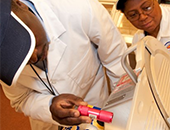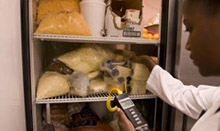Foodborne Outbreak Investigation Online Series
In collaboration with the TN Center of Excellence, the Center for Agriculture and Food Security and Preparedness (CAFSP) at the University of Tennessee has produced a series of CDC-funded, free, online courses focused on foodborne outbreak investigations and team development.
The Foodborne Outbreak Investigation Online Series is a unique hybrid online and in-person outbreak investigation team training curriculum. The curriculum includes 7 online courses that may be taken either as introductory training or as refresher training for more experienced staff. The standalone online courses take 3-4 hours each and can be completed independently by team members. Jurisdictions can download 4 complimentary tabletop team activities to continue the development of the acquired knowledge of the public health professionals who have completed the online courses.
The CAFSP is certified by the International Association for Continuing Education and Training (IACET), and participants who successfully complete the CAFSP online courses will be awarded Continuing Education Units (CEUs).
Register in the K@TE Learning Management System:
https://tennessee.csod.com/selfreg/register.aspx?p=tennessee&c=cafsp
Access your existing K@TE account:
https://tennessee.csod.com/client/tennessee/default.aspx
To request one of the courses in the Foodborne Outbreak Investigation Online Series, click on the individual course link below. Or, log in to your K@TE account and type the course name into the Search box in the upper right-hand corner.
Foodborne Outbreak Investigation Online Series Courses and Team Activities

The goal for this online course, which is the first part of a two part course, will be to train public health professionals and other involved personnel to rapidly identify, investigate and implement control measures for a foodborne disease outbreak to reduce the incidence of foodborne illness.
Estimated Time to Complete: 4 hours
CEUs: 0.4
Registration Link: Course 1: Foodborne Outbreak Investigation and Response: Part A

The goal for this online course is to train public health professionals and other personnel to rapidly identify, investigate and implement control measures for a foodborne disease outbreak to reduce the incidence of foodborne illness.
Estimated Time to Complete: 4 hours
CEUs: 0.4
Registration Link: Course 2: Foodborne Outbreak Investigation and Response Team Roles and Responsibilities: Part B

Start this activity after completing:
- Course 1: Foodborne Outbreak Investigation and Response Team Roles and Responsibilities: Part A
- Course 2: Foodborne Outbreak Investigation and Response Team Roles and Responsibilities: Part B
Please email Siobhan.Dodds@tn.gov to obtain Activity 1: Communication Procedures.

The goal of this course is to provide information on the initial actions taken during the investigation of foodborne illness. Information includes specimen and sample collection, effective interviewing techniques, and communication strategies that can be effective during the initial investigation.
Estimated Time to Complete: 4 hours
CEUs: 0.4
Registration Link: Course 3: Initial Foodborne Illness Investigation

-
• Start this activity after completing Course 3: Initial Foodborne Illness Investigation
•
Please email Siobhan.Dodds@tn.gov to obtain Activity 2: Interviewer Training.

The Environmental Health Investigations course will provide information on environmental health investigations, inspections, and environmental assessment activities. Information will include food sampling and shipping; the steps involved in product tracing for investigations; and the implementation of control measures.
Estimated Time to Complete: 5 hours
CEUs: 0.4
Registration Link: Course 4: Environmental Health Investigations

This course covers key elements of an epidemiologic investigation into a foodborne outbreak. Also, this course covers topics including initiating the investigation; collecting and interpreting data; identifying illness sources; and implementing outbreak control measures.
Estimated Time to Complete: 4 hours
CEUs: 0.4
Registration Link: Course 5: Epidemiologic Investigations Related to Foodborne Outbreaks

This course covers key elements of a laboratory investigation into a foodborne outbreak. This course includes topics, such as the determination of likely causative agents; special considerations in collecting and submitting clinical samples and food specimens; and subtyping of the causative agents.
Estimated Time to Complete: 2 hours
CEUs: 0.2
Registration Link: Course 6: Laboratory Investigations Related to Foodborne Outbreaks.

-
• Start this activity after completing Course 6: Laboratory Investigations Related to Foodborne Outbreaks
•
Please email Siobhan.Dodds@tn.gov to obtain Activity 3: Environmental, Epidemiologic, and Laboratory Investigations.

An overview of knowledge and skills necessary to conclude an investigation.
Estimated Time to Complete: 3 hours
CEUs: 0.3
Registration Link: Course 7: Concluding the Investigation

-
• Start this activity after completing Course 7: Concluding the Investigation
• Please email Siobhan.Dodds@tn.gov to obtain Activity 4: Response Plan Review.
REDCap Videos (Research Electronic Data Capture)
REDCap (Research Electronic Data Capture) is a HIPAA-secure, web-based application for building and maintaining online surveys and databases. This video explains why REDCap may be beneficial, demonstrates how to navigate the site (including where to find answers to FAQs), and outlines terms used when creating databases.
Poor quality or incomplete data can negatively impact decisions made as it leads to inaccurate analysis, increased case investigation completion time, and a reduced ability to construct effective strategies. Integrated features within REDCap give assurance the data collected is high quality. This video explores creating a succinct yet polished and complete database that houses reliable data.
This video explains the importance of moving a finished REDCap project from development status to production status to initiate established data safeguards. Additionally, the video delves into which survey settings can be modified and the different ways to disseminate the survey.
This video focuses on how REDCap allows the project creator to restrict data access to essential personnel and why data restriction is of utmost importance. It also demonstrates how to enter records into REDCap and track survey completion.
Instructor Led Courses

Developed by the National Environmental Health Association and the Centers for Disease Control and Prevention, Epi-Ready is a two-day in-person workshop for environmental and public health professionals with responsibility for the investigation of foodborne illness outbreaks.

With a team-based approach to training, Epi-Ready focuses on how to efficiently and effectively respond to an outbreak by understanding the roles and responsibilities of the disciplines involved—using the analogy of the 4-legged stool.

The Epi-Ready 4-legged stool represents collaboration between the three disciplines involved in a foodborne illness investigation, environmental health specialists/sanitarians, epidemiologists and laboratory staff. The fourth leg of the stool comprises all others who directly or indirectly are involved in outbreak investigations, including public health nurses, health educators, industry, risk communication/public information officers, and others.
Workshop content is designed to follow the Council to Improve Foodborne Outbreak Response (CIFOR) Guidelines.
Topics are covered through a combination of lecture, question and answer sessions, interactive group exercises and final case study.
Epi-Ready goals are that each leg of the stool…
- Better understand the roles and responsibilities of all disciplines in an investigation.
- Build a more efficient working relationship and open lines of communication with partners.
- Understand that collaboration is KEY!
To set up a training session in your jurisdiction, please contact Siobhan Dodds at siobhan.dodds@tn.gov and Katie Garman at katie.garman@tn.gov
 This training is designed to provide teaching strategies for potential instructors to train staff in their agencies or departments. This training emphasizes the importance of the teamwork involved in foodborne disease investigation. We encourage attendees from environmental health professionals, epidemiologists, and laboratory staff from the same or partnering agencies or jurisdictions to attend.
This training is designed to provide teaching strategies for potential instructors to train staff in their agencies or departments. This training emphasizes the importance of the teamwork involved in foodborne disease investigation. We encourage attendees from environmental health professionals, epidemiologists, and laboratory staff from the same or partnering agencies or jurisdictions to attend.
To set up a training session in your jurisdiction, please contact Siobhan Dodds at siobhan.dodds@tn.gov and Katie Garman at katie.garman@tn.gov
Professional Development

The Department of Public Health and the University of Tennessee, Knoxville (Department of Public Health and Department of Food Science and Technology) jointly offer a fully online graduate certificate in food safety to prepare public health and food industry leaders, researchers, educators, and practitioners to understand and apply knowledge and skills to enhance food safety and prevent food-related disease.
The Center for Agriculture and Food Security and Preparedness, the Department of Biomedical and Diagnostic Sciences, and the College of Veterinary Medicine are partners supporting this certificate.
The certificate offering is coordinated through the Tennessee Integrated Food Safety Center of Excellence and is administratively housed in the Department of Public Health.
The certificate program is designed to build upon and expand concepts from core courses of the curriculum of each discipline’s master’s degree programs and the previous experiences and interests of students.
Credit hours obtained for the certificate may also count as graduate degree hours. The certificate is also designed for the current workforce in public health or food industry-related employment to acquire additional training and expertise relevant to their job functions.
 Dr. Kathleen C. Brown, PhD, MPH
Dr. Kathleen C. Brown, PhD, MPH
For more information, please contact Dr. Brown.
Email: kcbrown@utk.edu
Phone: 865-974-1104